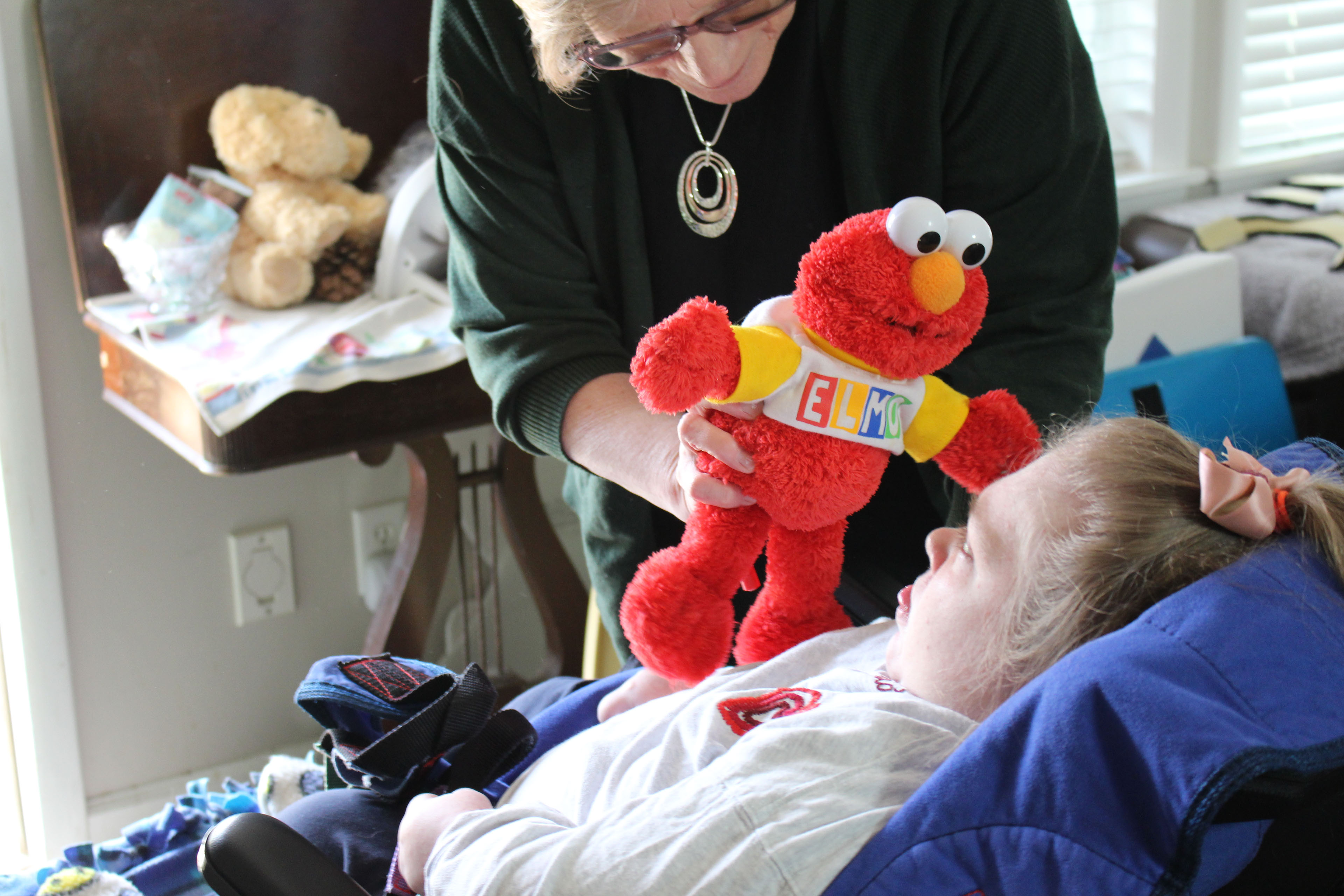Kaiser Health News
Most States Ban Shackling Pregnant Women in Custody, Yet Many Report Being Restrained
Renuka Rayasam
Fri, 17 Nov 2023 10:00:00 +0000
Ashley Denney was about seven months pregnant in 2022 when police handcuffed her during an arrest in Carroll County, Georgia. Officers shackled her even though the state bans the use of restraints on pregnant women in custody beginning at the second trimester.
In early July, she said, it happened again.
“I asked the officer, ‘Please, pull over. I’m not supposed to be handcuffed. I’m pregnant,’” said Denney. At the time, she was near the end of her first trimester, though she believed her pregnancy was more advanced. Arresting officers did not know she was pregnant, said an official with the Carrollton Police Department who reviewed video footage of that arrest.
Medical groups, such as the American College of Obstetricians and Gynecologists, widely condemn shackling pregnant people, which they argue is unethical and unsafe because it increases the risk of falls, hinders medical care, and endangers the fetus.
About 40 states, including Georgia, have passed laws limiting the use of restraints such as handcuffs, leg restraints, and belly chains on pregnant people in law enforcement custody, according to a Johns Hopkins University research group. Laws that seek to improve treatment of pregnant women in jails and prisons have drawn bipartisan support, including the First Step Act, which was passed in 2018 and limits the use of restraints on pregnant people in federal custody. Yet advocates say they continue logging reports of law enforcement agencies and hospital staffers ignoring such prohibitions and allowing pregnant people to be chained, handcuffed, or otherwise restrained.
Confusion over the laws, lack of sanctions for violations, and wide loopholes are contributing to the continued shackling of pregnant women in custody. But it’s nearly impossible to get an accurate picture of the prevalence because of limited data collection and little independent oversight.
“People see laws like these, and they say ‘check.’ They don’t know how they are being implemented and if they are creating the outcomes intended,” said Ashley Lovell, co-director of the Alabama Prison Birth Project, a group that works with pregnant prisoners. Without oversight, these laws “are words on paper,” she said. “They don’t mean anything.”
U.S. jails admit 55,000 pregnant people each year, according to estimates based on 2017 data from research led by Carolyn Sufrin, a gynecology and obstetrics associate professor at Johns Hopkins University who researches pregnancy care in jails and prisons. “The fact that we don’t know what is happening is part of the story itself,” she said.
Yet reports of shackling continue to surface, often making local headlines.
In January, a Georgia woman, 32 weeks pregnant, was shackled for hours while waiting for a medical appointment and during transport, according to Pamela Winn, founder of RestoreHER US.America, a group that works with people entangled in the criminal justice system. The woman did not want to be identified because she is in state custody and fears retaliation. She said her handcuffs were removed only after a request from medical staffers.
Her experience was echoed by women nationwide in law enforcement custody.
Minnesota passed an anti-shackling bill in 2014, but six years later a suburban Minneapolis woman sued Hennepin County after a wrongful arrest during which she was shackled while in active labor — an incident first reported by local media.
And despite Texas’ shackling ban, in August 2022 an officer in Harris County, which includes Houston, chained Amy Growcock’s ankle to a bench in a courthouse holding area for hours.
“It was pretty painful,” said Growcock, who was eight months pregnant and worried about circulation being cut off in her swollen leg.
Prohibitions on shackling have run into the realities of the country’s complicated web of penal institutions. Millions of people are held in a system that includes thousands of county jails, state and federal prisons, and private facilities with varying policies. Facilities often operate with little or no independent oversight, said Corene Kendrick, deputy director of the ACLU National Prison Project.
Some ACLU chapters have been logging complaints about violations of state bans on shackling pregnant people in jails and prisons. It appears, from complaints and oversight reports, that officials are usually left to interpret the law and police their own behavior, said Kendrick.
The Georgia law bans restraining pregnant women in their second and third trimesters and allows restraints in certain circumstances immediately postpartum. The state Department of Corrections maintains an anti-shackling policy for pregnant people in state custody and requires violations to be reported. But agency officials, in response to records requests from KFF Health News, said there were no incident reports regarding shackling in 2022 and through late October.
The Georgia Sheriffs’ Association asks county jails to voluntarily submit data on shackling, but only 74 of the 142 jails sent reports in 2022. Those jails reported holding 1,016 pregnant women but only two inmates who were restrained in the immediate postpartum period.
Association officials contend that shackling is rare. “Our jail people have a lot of common sense and compassion and do not do something to intentionally hurt somebody,” said Bill Hallsworth, director of jail and court services for the association. Many rural jails don’t have medical staffers to immediately verify a pregnancy, he added.
The Carrollton Police Department, whose officers handcuffed Denney, maintain that the law didn’t apply during her arrest, before her booking into a facility, according to public information officer Sgt. Meredith Hoyle Browning.
“It sounds like, to me, that there has been wide interpretation of this bill by the people we are asking to enforce it,” said Georgia state Rep. Sharon Cooper, a Republican who authored the state’s bill. Cooper said she hadn’t been notified of any incidents but added that if pregnant incarcerated women are still being shackled, legislators may need to revise the law.
In addition, some incidents in which jailors shackle pregnant people fall into legal loopholes. In Texas, as in many other states, officers can make exceptions when they feel threatened or perceive a flight risk. Last year 111 pregnant women reported being restrained in jail, according to a Texas Commission on Jail Standards report in April. In more than half the cases, women were shackled during transport even though that’s when they are most likely to fall.
The Texas commission has sent memos to jails that violate the shackling policy, but documents reviewed by KFF Health News show the agency stopped short of issuing sanctions.
Most states don’t allocate funding to educate correctional officers and hospital staff members on the laws. More than 80% of perinatal nurses reported that the pregnant prisoners they care for were sometimes or always shackled, and the vast majority were unaware of laws around the use of restraints, as well as of a nurses association’s position against their use, according to a 2019 study.
Even when medical professionals object to restraints, they generally defer to law enforcement officials.
Southern Regional Medical Center, just south of Atlanta, handles pregnant incarcerated patients from the Georgia Department of Corrections, the Clayton County Jail, and other facilities, said Kimberly Golden-Benner, the hospital’s director of business development, marketing, and communications. She said clinicians request that officers remove restraints when pregnant incarcerated patients arrive at the center for labor and delivery. But it’s still at the officers’ discretion, she said.
The Clayton County Sheriff’s Office didn’t return a request for comment. The state Department of Corrections maintains a policy of limiting the use of restraints on pregnant incarcerated people to only extreme cases, such as when there is an imminent escape risk, said Joan Heath, public affairs director. All staff members at facilities for women are required to complete an annual training course that outlines the policy, she said.
Strengthening the laws will require funding for implementation, such as creating model policies for hospitals and law enforcement staffs; continuous training; tighter reporting requirements; and sanctions for violations, advocates say.
“The laws are a necessary step and draw attention to the issue,” said Sufrin, the Johns Hopkins professor. They are “by no means enough to ensure the practice doesn’t happen.”
Winn wants states to allow pregnant women to bond out of jail immediately and defer sentences until after they give birth. In Colorado a law took effect in August that encourages courts to consider alternative sentences for pregnant defendants. Florida lawmakers considered but did not pass a similar measure this year.
The use of restraints is a window into mistreatment that pregnant women face in jails and prisons.
Denney said that in August she was mistakenly given medication for depression and anxiety instead of nausea; her morning sickness worsened, and she missed a meal.
The medical staff doesn’t have a record of Denney being given the wrong medication, said Brad Robinson, chief deputy of the Carroll County Sheriff’s Office.
“They don’t take you seriously,” Denney said of the pregnancy care she has received while incarcerated. “They should at least make sure the babies are all right.”
Growcock said her initial shackling in Houston was the first sign that officers weren’t equipped to handle pregnant people. She gave birth in a jail cell and nearly lost her son less than two weeks after her arrest. The Texas Commission on Jail Standards acknowledged that Growcock, who photographed her ankle in restraints, had been shackled. But the jail overseer admitted no other wrongdoing in her case, according to a memo the commission sent to the Harris County Jail.
“I felt like if I wasn’t getting treated right already, then the whole experience was going to be bad,” she said. “And it was.”
——————————
By: Renuka Rayasam
Title: Most States Ban Shackling Pregnant Women in Custody, Yet Many Report Being Restrained
Sourced From: kffhealthnews.org/news/article/pregnant-women-prison-handcuffs-restraints-laws/
Published Date: Fri, 17 Nov 2023 10:00:00 +0000
Did you miss our previous article…
https://www.biloxinewsevents.com/beyond-insulin-medi-cal-expands-patient-access-to-diabetes-supplies/
Kaiser Health News
A California Lawmaker Leans Into Her Medical Training in Fight for Health Safety Net
SACRAMENTO, Calif. — State Sen. Akilah Weber Pierson anticipates that California’s sprawling Medicaid program, known as Medi-Cal, may need to be dialed back after Gov. Gavin Newsom releases his latest budget, which could reflect a multibillion-dollar deficit.
Even so, the physician-turned-lawmaker, who was elected to the state Senate in November, says her priorities as chair of a budget health subcommittee include preserving coverage for the state’s most vulnerable, particularly children and people with chronic health conditions.
“We will be spending many, many hours and long nights figuring this out,” Weber Pierson said of the lead-up to the state’s June 15 deadline for lawmakers to pass a balanced budget.
With Medicaid cuts on the table in Washington and Medi-Cal running billions of dollars over budget due to rising drug prices and higher-than-anticipated costs to cover immigrants without legal status, Weber Pierson’s dual responsibilities — maintaining a balanced budget and delivering compassionate care to the state’s poorest residents — could make her instrumental in leading Democrats through this period of uncertainty.
President Donald Trump has said GOP efforts to cut federal spending will not touch Medicaid beyond “waste, fraud, and abuse.” Congressional Republicans are considering going after states such as California that extend coverage to immigrants without legal status and imposing restrictions on provider taxes. California voters in November made permanent the state’s tax on managed-care health plans to continue funding Medi-Cal.
The federal budget megabill is winding its way through Congress, where Republicans have set a target of $880 billion in spending cuts over 10 years from the House committee that oversees the Medicaid program.
Health care policy researchers say that would inevitably force the program to restrict eligibility, narrow the scope of benefits, or both. Medi-Cal covers 1 in 3 Californians, and more than half of its nearly $175 billion budget comes from the federal government.
One of a handful of practicing physicians in the state legislature, Weber Pierson is leaning heavily on her experience as a pediatric and adolescent gynecologist who treats children with reproductive birth defects — one of only two in Southern California.
Weber Pierson spoke to KFF Health News correspondent Christine Mai-Duc in Sacramento this spring. She has introduced bills to improve timely access to care for pregnant Medi-Cal patients, require developers to mitigate bias in artificial intelligence algorithms used in health care, and compel health plans to cover screenings for housing, food insecurity, and other social determinants of health.
This interview has been edited for length and clarity.
Q: You’re a state senator, you practice medicine in your district, and you’re also a mom. What does that look like day to day?
A: When you grow up around someone who juggles a lot, that just kind of becomes the norm. I saw this with my mom [former state Assembly member Shirley Weber, who is now secretary of state].
I’m really happy that I’m able to continue with my clinical duties. Those in the health care profession understand how much time, energy, effort, and money we put into becoming a health care provider, and I’m still fairly early in my career. With my particular specialty, it would also be a huge void in the San Diego region for me to step back.
Q: What are the biggest threats or challenges in health care right now?
A: The immediate threats are the financial issues and our budget. A lot of people do not understand the overwhelming amount of dollars that go into our health care system from the federal government.
Another issue is access. Almost everybody in California is covered by insurance. The problem is that we have not expanded access to providers. If you have insurance but your nearest labor and delivery unit is still two hours away, what exactly have we really done for those patients?
The third thing is the social determinants of health. The fact that your life expectancy is based on the ZIP code in which you were born is absolutely criminal. Why are certain areas devoid of having supermarkets where you can go and get fresh fruits and vegetables? And then we wonder why certain people have high blood pressure and diabetes and obesity.
Q: On the federal level, there’s a lot of conversation happening around Medicaid cuts, reining in the MCO tax, and potentially dropping Affordable Care Act premium subsidies. Which is the biggest threat to California?
A: To be quite honest with you, all of those. The MCO tax was a recognition that we needed more providers, and in order to get more providers, we need to increase the Medi-Cal reimbursement rates. The fact that now it is at risk is very, very concerning. That is how we are able to care for those who are our most vulnerable in our state.
Q: If those cuts do come, what do we cut? How do we cut it?
A: We are in a position where we have to talk about it at this point. Our Medi-Cal budget, outside of what the federal government may do, is exploding. We definitely have to ensure that those who are our most vulnerable — our kids, those with chronic conditions — continue to have some sort of coverage. What will that look like?
To be quite honest with you, at this point, I don’t know.
Q: How can the state make it the least painful for Californians?
A: Sometimes the last one to the table is the first one to have to leave the table. And so I think that’s probably an approach that we will look at. What were some of the more recent things that we’ve added, and we’ve added a lot of stuff lately. How can we trim down — maybe not completely eliminate, but trim down on — some of these services to try to make them more affordable?
Q: When you say the last at the table, are you talking about the expansion of Medi-Cal coverage to Californians without legal status? Certain age groups?
A: I don’t want to get ahead of this conversation, because it is a very large conversation between not only me but also the [Senate president] pro tem, the Assembly speaker, and the governor’s office. But those conversations are being had, keeping in mind that we want to provide the best care for as many people as possible.
Q: You’re carrying a bill related to AI in health care this year. Tell me what you’re trying to address.
A: It has just exploded at a speed that I don’t know any of us were anticipating. We are trying to play catch-up, because we weren’t really at the table when all of this stuff was being rolled out.
As we advance in technology, it’s been great; we’ve extended lives. But we need to make sure that the biases that led to various discrepancies and health care outcomes are not the same biases that are inputted into that system.
Q: How does Sacramento policy impact your patients and what experience as a physician do you bring to policymaking?
A: I speak with my colleagues with actual knowledge of what’s happening with our patients, what’s happening in the clinics. My patients and my fellow providers will often come to me and say, “You guys are getting ready to do this, and this is why it’s going to be a problem.” And I’m like, “OK, that’s really good to know.”
I work at a children’s facility, and right after the election, specialty hospitals were very concerned around funding and their ability to continue to practice.
In the MCO discussion, I was hearing from providers, hospitals on the ground on a regular basis. With the executive order [on gender-affirming care for transgender youth], I have seen people that I work with concerned, because these are patients that they take care of. I’m very grateful for the opportunity to be in both worlds.
This article was produced by KFF Health News, which publishes California Healthline, an editorially independent service of the California Health Care Foundation.
KFF Health News is a national newsroom that produces in-depth journalism about health issues and is one of the core operating programs at KFF—an independent source of health policy research, polling, and journalism. Learn more about KFF.
USE OUR CONTENT
This story can be republished for free (details).
The post A California Lawmaker Leans Into Her Medical Training in Fight for Health Safety Net appeared first on kffhealthnews.org
Note: The following A.I. based commentary is not part of the original article, reproduced above, but is offered in the hopes that it will promote greater media literacy and critical thinking, by making any potential bias more visible to the reader –Staff Editor.
Political Bias Rating: Center-Left
This content leans center-left due to its focus on preserving and protecting Medi-Cal, a Medicaid program serving vulnerable populations, particularly children and immigrants. It highlights concerns about federal budget cuts proposed by Republicans and emphasizes the importance of maintaining social services, healthcare access, and addressing social determinants of health. The perspective is generally supportive of expanding healthcare coverage and cautious about fiscal reductions affecting marginalized groups, which aligns with moderate Democratic and progressive viewpoints.
Kaiser Health News
Cutting Medicaid Is Hard — Even for the GOP
The Host
Julie Rovner
KFF Health News
Julie Rovner is chief Washington correspondent and host of KFF Health News’ weekly health policy news podcast, “What the Health?” A noted expert on health policy issues, Julie is the author of the critically praised reference book “Health Care Politics and Policy A to Z,” now in its third edition.
After narrowly passing a budget resolution this spring foreshadowing major Medicaid cuts, Republicans in Congress are having trouble agreeing on specific ways to save billions of dollars from a pool of funding that pays for the program without cutting benefits on which millions of Americans rely. Moderates resist changes they say would harm their constituents, while fiscal conservatives say they won’t vote for smaller cuts than those called for in the budget resolution. The fate of President Donald Trump’s “one big, beautiful bill” containing renewed tax cuts and boosted immigration enforcement could hang on a Medicaid deal.
Meanwhile, the Trump administration surprised those on both sides of the abortion debate by agreeing with the Biden administration that a Texas case challenging the FDA’s approval of the abortion pill mifepristone should be dropped. It’s clear the administration’s request is purely technical, though, and has no bearing on whether officials plan to protect the abortion pill’s availability.
This week’s panelists are Julie Rovner of KFF Health News, Anna Edney of Bloomberg News, Maya Goldman of Axios, and Sandhya Raman of CQ Roll Call.
Panelists
Anna Edney
Bloomberg News
Maya Goldman
Axios
Sandhya Raman
CQ Roll Call
Among the takeaways from this week’s episode:
- Congressional Republicans are making halting progress on negotiations over government spending cuts. As hard-line House conservatives push for deeper cuts to the Medicaid program, their GOP colleagues representing districts that heavily depend on Medicaid coverage are pushing back. House Republican leaders are eying a Memorial Day deadline, and key committees are scheduled to review the legislation next week — but first, Republicans need to agree on what that legislation says.
- Trump withdrew his nomination of Janette Nesheiwat for U.S. surgeon general amid accusations she misrepresented her academic credentials and criticism from the far right. In her place, he nominated Casey Means, a physician who is an ally of HHS Secretary Robert F. Kennedy Jr.’s and a prominent advocate of the “Make America Healthy Again” movement.
- The pharmaceutical industry is on alert as Trump prepares to sign an executive order directing agencies to look into “most-favored-nation” pricing, a policy that would set U.S. drug prices to the lowest level paid by similar countries. The president explored that policy during his first administration, and the drug industry sued to stop it. Drugmakers are already on edge over Trump’s plan to impose tariffs on drugs and their ingredients.
- And Kennedy is scheduled to appear before the Senate’s Health, Education, Labor and Pensions Committee next week. The hearing would be the first time the secretary of Health and Human Services has appeared before the HELP Committee since his confirmation hearings — and all eyes are on the committee’s GOP chairman, Sen. Bill Cassidy of Louisiana, a physician who expressed deep concerns at the time, including about Kennedy’s stances on vaccines.
Also this week, Rovner interviews KFF Health News’ Lauren Sausser, who co-reported and co-wrote the latest KFF Health News’ “Bill of the Month” installment, about an unexpected bill for what seemed like preventive care. If you have an outrageous, baffling, or infuriating medical bill you’d like to share with us, you can do that here.
Plus, for “extra credit” the panelists suggest health policy stories they read this week that they think you should read, too:
Julie Rovner: NPR’s “Fired, Rehired, and Fired Again: Some Federal Workers Find They’re Suddenly Uninsured,” by Andrea Hsu.
Maya Goldman: STAT’s “Europe Unveils $565 Million Package To Retain Scientists, and Attract New Ones,” by Andrew Joseph.
Anna Edney: Bloomberg News’ “A Former TV Writer Found a Health-Care Loophole That Threatens To Blow Up Obamacare,” by Zachary R. Mider and Zeke Faux.
Sandhya Raman: The Louisiana Illuminator’s “In the Deep South, Health Care Fights Echo Civil Rights Battles,” by Anna Claire Vollers.
Also mentioned in this week’s podcast:
Credits
Francis Ying
Audio producer
Emmarie Huetteman
Editor
To hear all our podcasts, click here.
And subscribe to KFF Health News’ “What the Health?” on Spotify, Apple Podcasts, Pocket Casts, or wherever you listen to podcasts.
We encourage organizations to republish our content, free of charge. Here’s what we ask:
You must credit us as the original publisher, with a hyperlink to our kffhealthnews.org site. If possible, please include the original author(s) and KFF Health News” in the byline. Please preserve the hyperlinks in the story.
It’s important to note, not everything on kffhealthnews.org is available for republishing. If a story is labeled “All Rights Reserved,” we cannot grant permission to republish that item.
Have questions? Let us know at KHNHelp@kff.org
The post Cutting Medicaid Is Hard — Even for the GOP appeared first on kffhealthnews.org
Note: The following A.I. based commentary is not part of the original article, reproduced above, but is offered in the hopes that it will promote greater media literacy and critical thinking, by making any potential bias more visible to the reader –Staff Editor.
Political Bias Rating: Center-Left
The content provides a balanced overview of current health policy issues with a slight lean towards framing Republican budget efforts and Medicaid cuts critically, emphasizing the potential negative impacts on constituents reliant on these programs. The coverage fairly presents multiple viewpoints, including fiscal conservatives and moderates within the Republican Party, but the tone suggests some skepticism towards conservative budget priorities and Trump administration policies. Overall, the focus on health care access and concerns about cuts aligns with a center-left perspective without strong partisan language or ideological bias.
Kaiser Health News
As Republicans Eye Sweeping Medicaid Cuts, Missouri Offers a Preview
CRESTWOOD, Mo. — The prospect of sweeping federal cuts to Medicaid is alarming to some Missourians who remember the last time the public medical insurance program for those with low incomes or disabilities was pressed for cash in the state.
In 2005, Missouri adopted some of the strictest eligibility standards in the nation, reduced benefits, and increased patients’ copayments for the joint federal-state program due to state budget shortfalls totaling about $2.4 billion over several prior years. More than 100,000 Missourians lost coverage as a result, and the Federal Reserve Bank of Philadelphia reported that the changes led to increases in credit card borrowing and debt in third-party collections.
A woman told NPR that year that her $6.70-an-hour McDonald’s job put her over the new income limits and rendered her ineligible, even though she was supporting three children on about $300 a week. A woman receiving $865 a month in disability payments worried at a town hall meeting about not being able to raise her orphaned granddaughter as the state asked her to pay $167 a month to keep her health coverage.
Now, Missouri could lose an estimated $2 billion a year in federal funding as congressional Republicans look to cut at least $880 billion over a decade from a pool of funding that includes Medicaid programs nationwide. Medicaid and the closely related Children’s Health Insurance Program together insure roughly 79 million people — about 1 in 5 Americans.
“We’re looking at a much more significant impact with the loss of federal funds even than what 2005 was,” said Amy Blouin, president of the progressive Missouri Budget Project think tank. “We’re not going to be able to protect kids. We’re not going to be able to protect people with disabilities from some sort of impact.”
At today’s spending levels, a cut of $880 billion to Medicaid could lead to states’ losing federal funding ranging from $78 million a year in Wyoming to $13 billion a year in California, according to an analysis from KFF, a health information nonprofit that includes KFF Health News. State lawmakers nationwide would then be left to address the shortfalls, likely through some combination of slashing benefits or eligibility, raising taxes, or finding a different large budget item to cut, such as education spending.
Republican lawmakers are floating various proposals to cut Medicaid, including one to reduce the money the federal government sends to states to help cover adults who gained access to the program under the Affordable Care Act’s provision known as Medicaid expansion. The 2010 health care law allowed states to expand Medicaid eligibility to cover more adults with low incomes. The federal government is picking up 90% of the tab for that group. About 20 million people nationwide are now covered through that expansion.
Missouri expanded Medicaid in 2021. That has meant that a single working-age adult in Missouri can now earn up to $21,597 a year and qualify for coverage, whereas before, nondisabled adults without children couldn’t get Medicaid coverage. That portion of the program now covers over 329,000 Missourians, more than a quarter of the state’s Medicaid recipients.
For every percentage point that the federal portion of the funding for that group decreases, Missouri’s Medicaid director estimated, the state could lose $30 million to $35 million a year.
But the equation is even more complicated given that Missouri expanded access via a constitutional amendment. Voters approved the expansion in 2020 after the state’s Republican leadership resisted doing so for a decade. That means changes to Medicaid expansion in Missouri would require voters to amend the state constitution again. The same is true in South Dakota and Oklahoma.
So even if Congress attempted to narrowly target cuts to the nation’s Medicaid expansion population, Washington University in St. Louis health economist Timothy McBride said, Missouri’s expansion program would likely stay in place.
“Then you would just have to find the money elsewhere, which would be brutal in Missouri,” McBride said.
In Crestwood, a suburb of St. Louis, Sandra Smith worries her daughter’s in-home nursing care would be on the chopping block. Nearly all in-home services are an optional part of Medicaid that states are not required to include in their programs. But the services have been critical for Sandra and her 24-year-old daughter, Sarah.
Sarah Smith has been disabled for most of her life due to seizures from a rare genetic disorder called Dravet syndrome. She has been covered by Medicaid in various ways since she was 3.

She needs intensive, 24-hour care, and Medicaid pays for a nurse to come to their home 13 hours a day. Her mother serves as the overnight caregiver and covers when the nurses are sick — work Sandra Smith is not allowed to be compensated for and that doesn’t count toward the 63-year-old’s Social Security.
Having nursing help allows Sandra Smith to work as an independent podcast producer and gives her a break from being the go-to-person for providing care 24 hours a day, day after day, year after year.
“I really and truly don’t know what I would do if we lost the Medicaid home care. I have no plan whatsoever,” Sandra Smith said. “It is not sustainable for anyone to do infinite, 24-hour care without dire physical health, mental health, and financial consequences, especially as we parents get into our elder years.”
Elias Tsapelas, director of fiscal policy at the conservative Show-Me Institute, said potential changes to Medicaid programs depend on the extent of any budget cuts that Congress ultimately passes and how much time states have to respond.
A large cut implemented immediately, for example, would require state legislators to look for parts of the budget they have the discretion to cut quickly. But if states have time to absorb funding changes, he said, they would have more flexibility.
“I’m not ready to think that Congress is going to willingly put us on the path of making every state go cut their benefits for the most vulnerable,” Tsapelas said.
Missouri’s congressional delegation split along party lines over the recent budget resolution calling for deep spending cuts, with the Republicans who control six of the eight House seats and both Senate seats all voting for it.
But 76% of the public, including 55% of Republicans, say they oppose major federal funding cuts to Medicaid, according to a national KFF poll conducted April 8-15.
And Missouri Sen. Josh Hawley, a Republican, has said that he does not support cutting Medicaid and posted on the social platform X that he was told by President Donald Trump that the House and Senate would not cut Medicaid benefits and that Trump won’t sign any benefit cuts.
“I hope congressional leadership will get the message,” Hawley posted. He declined to comment for this article.
U.S. House Republicans are aiming to pass a budget by Memorial Day, after many state legislatures, including Missouri’s, will have adjourned for the year.
Meanwhile, Missouri lawmakers are poised to pass a tax cut that is estimated to reduce state revenue by about $240 million in the first year.
The post As Republicans Eye Sweeping Medicaid Cuts, Missouri Offers a Preview appeared first on kffhealthnews.org
Note: The following A.I. based commentary is not part of the original article, reproduced above, but is offered in the hopes that it will promote greater media literacy and critical thinking, by making any potential bias more visible to the reader –Staff Editor.
Political Bias Rating: Center-Left
This content displays a center-left political bias by emphasizing the negative impacts of proposed Republican-led federal cuts to Medicaid funding. It highlights the struggles of low-income and disabled individuals who rely on Medicaid, underscores the importance of Medicaid expansion, and includes perspectives from progressive advocates concerned about the consequences of funding reductions. Although it presents some conservative viewpoints, such as those from the Show-Me Institute and mentions Republican lawmakers’ positions, the overall tone supports maintaining or expanding social welfare programs, reflecting a center-left leaning perspective.
-

 News from the South - Missouri News Feed5 days ago
News from the South - Missouri News Feed5 days agoMissouri family, two Oklahoma teens among 8 killed in Franklin County crash
-

 News from the South - North Carolina News Feed3 days ago
News from the South - North Carolina News Feed3 days agoAerospace supplier, a Fortune 500 company, chooses North Carolina site | North Carolina
-

 News from the South - Georgia News Feed5 days ago
News from the South - Georgia News Feed5 days agoMotel in Roswell shutters after underage human trafficking sting | FOX 5 News
-

 News from the South - North Carolina News Feed3 days ago
News from the South - North Carolina News Feed3 days agoRaleigh woman gets 'miracle' she prayed for after losing thousands in scam
-

 News from the South - Florida News Feed2 days ago
News from the South - Florida News Feed2 days agoPalm Bay suspends school zone speed cameras again, this time through rest of school year
-

 News from the South - Georgia News Feed7 days ago
News from the South - Georgia News Feed7 days ago72nd Annual Reunion for those who once lived in Dunbarton, Sc
-

 News from the South - North Carolina News Feed7 days ago
News from the South - North Carolina News Feed7 days agoGas station employee killed, customer assaulted in Harnett Co. robbery
-

 Mississippi Today5 days ago
Mississippi Today5 days agoCoast protester suffers brain bleed after alleged attack by retired policeman





































![HIGH SCHOOL SOFTBALL: East Central vs Vancleave (5/10/2025) [5A Playoffs, South State Game 2]](https://www.biloxinewsevents.com/wp-content/uploads/2025/05/1746971504_maxresdefault-80x80.jpg)











